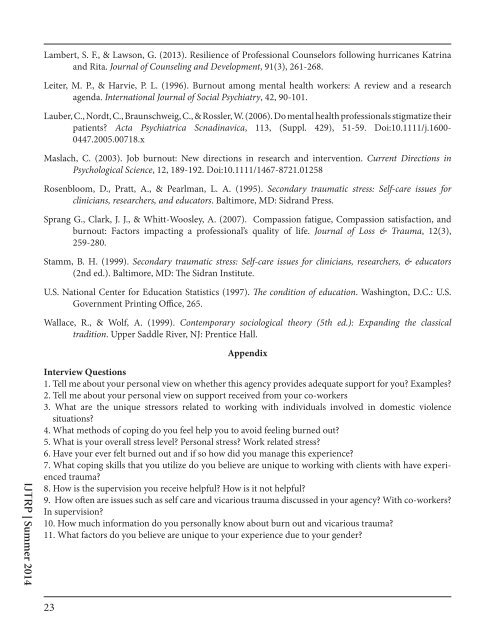Lambert, S. F., & Lawson, G. (2013). Resilience <strong>of</strong> Pr<strong>of</strong>essional Counselors following hurricanes Katrina<strong>and</strong> Rita. <strong>Journal</strong> <strong>of</strong> Counseling <strong>and</strong> Development, 91(3), 261-268.Leiter, M. P., & Harvie, P. L. (1996). Burnout among mental health workers: A review <strong>and</strong> a researchagenda. <strong>International</strong> <strong>Journal</strong> <strong>of</strong> Social Psychiatry, 42, 90-101.Lauber, C., Nordt, C., Braunschweig, C., & Rossler, W. (2006). Do mental health pr<strong>of</strong>essionals stigmatize theirpatients? Acta Psychiatrica Scnadinavica, 113, (Suppl. 429), 51-59. Doi:10.1111/j.1600-0447.2005.00718.xMaslach, C. (2003). Job burnout: New directions in research <strong>and</strong> intervention. Current Directions inPsychological Science, 12, 189-192. Doi:10.1111/1467-8721.01258Rosenbloom, D., Pratt, A., & Pearlman, L. A. (1995). Secondary traumatic stress: Self-care issues forclinicians, researchers, <strong>and</strong> educators. Baltimore, MD: Sidr<strong>and</strong> Press.Sprang G., Clark, J. J., & Whitt-Woosley, A. (2007). Compassion fatigue, Compassion satisfaction, <strong>and</strong>burnout: Factors impacting a pr<strong>of</strong>essional’s quality <strong>of</strong> life. <strong>Journal</strong> <strong>of</strong> Loss & <strong>Trauma</strong>, 12(3),259-280.Stamm, B. H. (1999). Secondary traumatic stress: Self-care issues for clinicians, researchers, & educators(2nd ed.). Baltimore, MD: The Sidran Institute.U.S. National Center for Education Statistics (1997). The condition <strong>of</strong> education. Washington, D.C.: U.S.Government Printing Office, 265.Wallace, R., & Wolf, A. (1999). Contemporary sociological theory (5th ed.): Exp<strong>and</strong>ing the classicaltradition. Upper Saddle River, NJ: Prentice Hall.AppendixIJTRP | Summer 2014Interview Questions1. Tell me about your personal view on whether this agency provides adequate support for you? Examples?2. Tell me about your personal view on support received from your co-workers3. What are the unique stressors related to working with individuals involved in domestic violencesituations?4. What methods <strong>of</strong> coping do you feel help you to avoid feeling burned out?5. What is your overall stress level? Personal stress? Work related stress?6. Have your ever felt burned out <strong>and</strong> if so how did you manage this experience?7. What coping skills that you utilize do you believe are unique to working with clients with have experiencedtrauma?8. How is the supervision you receive helpful? How is it not helpful?9. How <strong>of</strong>ten are issues such as self care <strong>and</strong> vicarious trauma discussed in your agency? With co-workers?In supervision?10. How much information do you personally know about burn out <strong>and</strong> vicarious trauma?11. What factors do you believe are unique to your experience due to your gender?23
Treating the Angry BrainPatrick Powell Ed. D., NCC, LPC, LMHC <strong>and</strong> Michael Dubi Ed. D, LMHC, Argosy University Sarasota“<strong>Anger</strong> management problem” is a familiar term to many clinicians. The phrase is commonly appliedto individuals seeking treatment for impulsivity, mood disorders, criminal <strong>of</strong>fenses, or frequent acts<strong>of</strong> violence (Eckhardt, Samper, & Murphy, 2008). Some <strong>of</strong> these individuals defer the blame for their actionsto others. “They made me do it. They pushed my buttons.” Other individuals claim their actions wereoutside <strong>of</strong> anyone’s control. “I don’t know why I did it, it just happened.” The individual may blame family,clinicians providing treatment or people in authority such as the police or a supervisor at work (Gascon etal., 2012). “I wasn’t doing anything wrong, they just arrested me. I don’t think there’s anything wrong withme. I’m here because you say I have to be.”For most individuals anger dissipates within moments. However, many individuals have experienceda lifetime <strong>of</strong> anger (Watt & Howells, 2010). They may have experienced significant trauma, verbal,physical, or sexual abuse, neglect, or bullying as a child. <strong>Anger</strong> may have begun as a purposeful <strong>and</strong> typicalresponse to protect oneself. As the individual matured, he or she may have continued to express anger forself protection <strong>and</strong> as a means to retain some level <strong>of</strong> power. By the time they reach adulthood, the individualmay have developed a pattern <strong>of</strong> anger <strong>and</strong> physical aggression impacting most or all areas <strong>of</strong> theirlives (Gomez, 2010).These individuals have trained their brains by continuous repetition to think, feel, <strong>and</strong> verballystate responses that maintain or lead to increased anger (Pally, 2007). For example, clients recounting storieswill <strong>of</strong>ten state, without realizing, that they verbally pushed someone into giving them an aggressiveresponse before physically fighting. Unsurprising, these individuals may not have experience communicatingin non-aggressive ways. They also may be defensive <strong>of</strong> their right to be angry, reluctant to continuetreatment, or need continual treatment during their lifespan (Gascon et al., 2012).Cognitive behavioral therapy is a frequent treatment method for anger management issues (Heseltine,Howells, & Day, 2010). Unfortunately, clinicians <strong>of</strong>ten become frustrated treating a population thatbecomes angry at the therapy process or stops attending treatment (Gascon et al., 2012). In an attempt toprovide better treatment outcomes, researchers have been exploring how the human brain relates to angermanagement (Denson, Pederson, Ronquillo, & N<strong>and</strong>y, 2009).For further the discussion, the reader should have a basic underst<strong>and</strong>ing <strong>of</strong> brain components. Thecerebral cortex is the largest part <strong>of</strong> the brain. It is responsible for higher brain functioning such as cognition<strong>and</strong> action. It consists <strong>of</strong> the frontal lobe, parietal lobe, occipital lobe, <strong>and</strong> temporal lobe. The cerebralcortex is divided into two halves: the left <strong>and</strong> right hemisphere. The left hemisphere is associated with logicabilities. The right hemisphere is associated with arts <strong>and</strong> the creativity (Yeo et al., 2011). The neocortex,a component <strong>of</strong> the cerebral cortex, is a six layered structure found only in mammals. It is responsible forhigher information processing (Rakic, 2009).Deeper in the brain, the cerebellum is smaller <strong>and</strong> evolutionarily older than the cerebral cortex. It isresponsible for coordinating movement <strong>and</strong> balance. The limbic system resides deep within the cerebrum<strong>and</strong> evolved earlier than the cerebellum. It contains the thalamus, hypothalamus, amygdala, <strong>and</strong> hippocampus(Rajmohan & Moh<strong>and</strong>as, 2007). The thalamus is responsible for relaying sensory <strong>and</strong> motor signalsto the cerebral cortex. The hypothalamus is responsible for metabolic processes. The hippocampus isresponsible for transferring short term to long term memory. It is also important for processing emotionalIJTRP | Summer 201424


